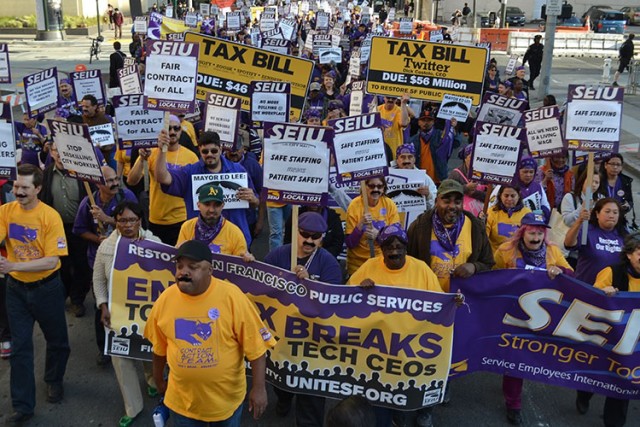
Alexandria Ocasio-Cortez is criticizing the massive tax incentives that New York is giving to Amazon – and that’s created a lot of much-needed discussion about the impact of tax breaks on corporate location decisions.

The conservative National Review agrees with the democratic socialist Ocasio-Cortez—tax breaks to entice companies to move to a city or region are generally ineffective and a bad idea.
Tax incentives aren’t anywhere near the top of the factors that company considers when deciding where to locate. In all likelihood, Amazon first surveyed all available locations searching for factors that really matter most — factors such as the presence of a skilled workforce, adequate infrastructure and transportation options (airports and a vast subway network), as well as synergies with other companies for the purpose of enhancing production supply chains and access to professional services. Once, it had a list of places that fit its needs, it might have taken under consideration the tax incentives.
Indeed, the literature is clear: Tax incentives aren’t what sway companies to move.
In fact, a new report from George Mason University says that economic development subsidies hurt more than they help:
Despite arguments from economic development officials justifying such subsidies, both economic theory and experience suggest that cities and states are throwing their money away when they court Amazon’s favor through subsidies. Even subsidies worth billions of dollars are unlikely to sway Amazon’s decision.
Not long after the Twitter tax break passed, I was at a program in the offices of Zendesk, one of the beneficiaries of the deal. I asked a senior Zendesk manager if the tax break was what attracted the company to mid-Market SF.
No, he said: It was the workforce in the city, the access to transportation, that fact that the people who he wanted to hire wanted to live there. “I’ll take the tax break,” he said. “But we would have come here anyway.”
Ocasio-Cortez raises a larger question than the wisdom or value of the tax breaks for Amazon in Long Island. She questions, and I think she is right, whether the new tech HQ will lead to massive displacement in Long Island City. Will the existing residents get the benefits of high-paying jobs – or will people move to that community to take those jobs and force longtime residents out?
That was certainly the case with the Twitter tax break, which attracted tens of thousands of new tech jobs to a city that had nowhere for those workers to live. Mayor Ed Lee justified the deal as a way to address high unemployment in the city, and Sup. Jane Kim, who backed the tax break, has told me that, given the high joblessness rates in SF at the time, it was a good idea.
But I would argue that the vast majority of the new tech jobs went to people who moved here from somewhere else – and existing unemployed residents didn’t get much benefit. Sure, spin-off jobs were created in the service industries – but they didn’t pay enough to make up for the huge hike in housing costs caused by the tech boom.
Some folks in LA are happy that they didn’t “win” the Amazon HQ:
“Thank God,” said Christopher Thornberg, founding partner of Los Angeles’ Beacon Economics, a go-to consultancy for California officials, and director of UC Riverside’s Center for Economic Forecasting.
“We have record low unemployment, skyrocketing housing costs, horrendous traffic and somehow we wanted to drop 50,000 overpaid techies into the middle of this?” he added. “What the hell. I don’t get the logic.”
Economic development is “best done by helping existing businesses grow, and by building more housing and infrastructure,” Thornberg said. “Not by spending millions of dollars in subsidies and countless man-hours chasing a monster like Amazon. Why do it? So politicians can have bragging rights.”
And the tax break didn’t require any data – before or after – on who got the jobs and how this impacted existing vulnerable communities. My friend and former student Nick Large, who works in the homeless housing field, points out:
Ever notice that when we subsidize large corporations or the wealthy, the demands for transparency and accountability pale in comparison to when we provide a social safety net for the poor? When we campaigned for YES on C – Our City Our Home SF in San Francisco, we were talking about a minuscule tax on corporations making more than $50 million, there were demands for research showing effectiveness of the programs, additional transparency on how the money would be spent, multiple advisory/oversight committees, multiple measurable goals, arguments on fairness of tax mechanisms, progress reports, annual reports, program based scoring, evaluation of contractors, and so much more.
Where are those demands in this situation? Tying SOME of the incentives to job creation is not even a starting point if your end goal is to provide for the people in the community already. What accountability measures are in place to actually guarantee that this will provide a measurable benefit, backed by objective data, to these communities?
There were none with the Twitter tax break. There will be none with future tax “incentives” that cities use in the name of “economic development.”
You can’t change bad policy directions without admitting that you were doing the wrong thing. At some point, everyone involved needs to accept reality and say: The Twitter tax break was wrong, on so many levels, in so many ways. Then the next time we can know better.


